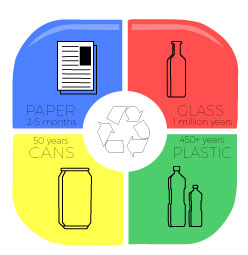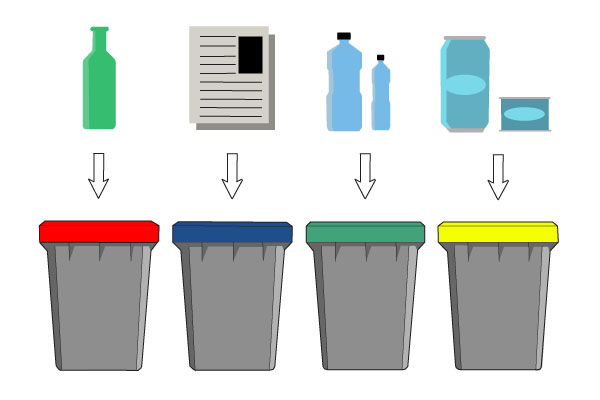
In a previous blog post we spoke about the importance and the need to recycle and with recycling rates falling as documented by The Guardian. We need to be more responsible with our waste and sorting into streams will certainly help to cut the recyclable waste going to landfill.
Current targets of recycling waste from the UK households must be around 50% by 2020. Without a radical change, it is possible that the UK will meet these targets. Should there be more incentives to recycling in a throwaway and disposable culture?
Why Should We Recycle?
- Increased waste is going to landfill due to an increased population
- New technological products and packing are constantly developing; consequently, these goods are not recyclable
- Lifestyle changes result in increased non-biodegradable waste
- Dangerous gasses and chemicals released from landfill sites are dangerous compared to recycling emissions
- Recycling reduces the need for landfill and raw materials reducing the effects of deforestation
- Making new products and technologies takes a lot of energy; therefore recycling reduces the need for as much energy
- With an increasing population, consequently we do not have the space for the increasing landfill sites
- Recycling will preserve natural resources for future generations
Types of Recyclable Material

Glass
Commonly in the form of bottles and jars domestically; the process of recycling glass involves crushing and melting. Glass can be recycling infinitely as it does not lose any quality during processing. Manufacturing glass from scratch uses a lot rawer materials, more energy & produces considerably more CO2 than recycling.
Paper
Almost all types of waste paper are recyclable; however, this process cannot occur indefinitely. Recycling usually occurs around 6 times.
Plastic
Post-consumer plastic recycling in the UK is low, this is a result of lacking technologies. The main reasons being is that many different types of plastic exist which complicates the process. It is currently a time-consuming process as plastic has to be sorted by hand, as a result the Plastic 2020 Challenge was created by the government which you can find out more about here.
Metal Cans
The most popular processing recycling material is the metal can; Aluminium & Steel in the UK. Recycling occurs indefinitely due to the purity of the contents. Recycling an aluminium can take only 5% of the energy needed to make a can from raw materials and will only release 5% of the emissions. With a high rate of recycling due to the ease of extraction and separation from other materials.
Waste Audit
Creating a waste Audit will give your work place a more in-depth knowledge of the waste your creating, from then you will be able to create an informed waste management plan.
Information you can gather from an audit includes: how waste is generated, the types and amount of waste you are generating.
Planning your audit is a good start to any audit, it doesn’t need to be long but should indicate:
| Objective | What Do You Need To Achieve? |
|---|---|
| Location | When & Where will the audit take place? Is there enough space to carry out the audit? |
| Health & Safety | Do you have the correct equipment for the audit? |
| Manual Handling Equipment | Do you need to lift heavy items? |
| Resource | How many people will you need to do the audit? |
| Notification | Do you need to inform internal personnel? |
| Methodology | Clear step by step method for sorting the waste will be needed |
| Risk Assessment | Must be completed |
As your sorting through your waste be sure to make notes so you can analyse the waste and ensure you, have enough streams to manage the waste effectively.
Waste Reduction Management
Whether your organisation is large or small; there should still be a waste policy in place. Becoming responsible with your waste is hard going; it will take time and effort. But there are some simple techniques to get started:
- Maximise the use of technology – this will reduce the amount of printing and photocopying
- When printing needs to occur ensure that the printer is set to double sided
- Control of stock room supply usage and ordering
- Regularly check mailing list for duplicates and out of date addresses
- Bulk buy supplies to reduce the amount of packaging
- Recycle toner cartridges
- Remove bins by staff desks, this will not only reduce the amount of waste created but also encourage waste separation via streams.
Creating a central waste area in which separation of waste can occur from the source will save time and effort. The easier way to do this is having separate bins for each waste material. Rubbermaid have created the perfect solution, the Slim Jim Recycling Center. The contemporary & smart recycling solution to effectively sort and manage waste. They are an advantageous size and will fit in many places. As a bank of containers they become mobile on interconnecting dollies. Their construction of recycled Polyethylene enables long life containers that will not rust, peel or chip. Rubbermaid offer a range of lids in various colours and for a multitude of uses which further consolidates waste separation.

Further Reading:
UK Recycling Policies
Decreasing Recycling Rates
Business Recycling Zone
Exeter University Waste Strategy
Waste Guidance